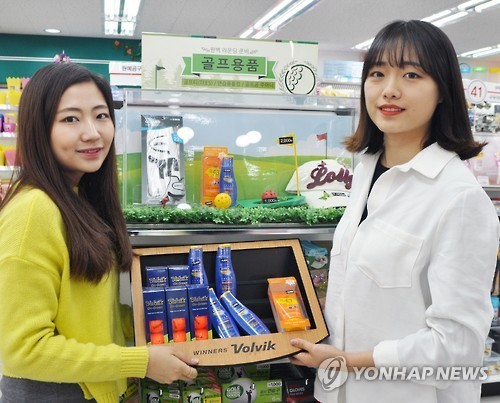More South Koreans choose to go for cheap but quality brands at places like dollar-shop chain Daiso and second-hand shops in search of good deals amid a prolonged economic slump, industry officials said Thursday.
Japan-based Daiso, which sells products priced from 2,000 and 5,000 won ($4.36), operates over 1,000 outlets across the country, a jump from 850 in 2012, the company said.
Japan-based Daiso, which sells products priced from 2,000 and 5,000 won ($4.36), operates over 1,000 outlets across the country, a jump from 850 in 2012, the company said.

"More consumers choose Daiso as the company has a team of officials who strictly maintain the product's quality," said a Daiso official. "The company has recently launched items that focus more on design in an effort to improve not only price but also quality."
Daiso said its sales came to 1.56 trillion won in 2016, more than a 30-percent jump from 1.2 trillion won posted a year earlier.
E-Mart, the nation's largest discount store chain by sales, also seeks to fill more than 40 percent of its total products to be exported with price-competitive PB products.
The PB brand, a generic brand first launched in April 2015, now has more than 1,000 products that range from toilet seats to cookies, the company said.
"The PB products, also known as 'no brand,' are the ones that have only the qualities that consumers really need," said Choi Sang-hoon, an E-Mart official.
The company said the sales from PB products jumped by more than eight-fold to 190 billion won in 2016 from 23.4 billion won logged a year earlier.
Sales at convenience stores frequented by lone diners or drinkers seeking value brands also have grown in recent years, the companies said.
Sales at convenience stores spiked 13.9 percent in December from a year ago, and supermarkets registered a 2 percent rise in sales. In December 2015, supermarket sales dropped 2.5 percent on-year.
CU reported that its accumulated sales during the first three quarters of 2016 jumped by 16.8 percent on-year.
More people are also opting for second-hand products from Internet websites.
Online shopping mall 11st Street said its revenues from its second-hand products website jumped by 53 percent on-year in 2016.
The company said its sales posted a double-digit jump for five years in a row as more consumers buy and sell various items ranging from laptops to high-end luxury goods.
"Previously, mostly people in their 40s used second-hand websites. However, more young consumers who value not only a low price but also quality increasingly prefer second-hand websites," said an 11st Street official. (Yonhap)



![[Exclusive] Korean military set to ban iPhones over 'security' concerns](http://res.heraldm.com/phpwas/restmb_idxmake.php?idx=644&simg=/content/image/2024/04/23/20240423050599_0.jpg&u=20240423183955)

![[Graphic News] 77% of young Koreans still financially dependent](http://res.heraldm.com/phpwas/restmb_idxmake.php?idx=644&simg=/content/image/2024/04/22/20240422050762_0.gif&u=)



![[Pressure points] Leggings in public: Fashion statement or social faux pas?](http://res.heraldm.com/phpwas/restmb_idxmake.php?idx=644&simg=/content/image/2024/04/23/20240423050669_0.jpg&u=)









